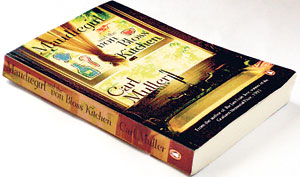Sex and food are Carl Muller’s twin obsessions in his latest offering. The fourth in a series that began with the Gratiaen Prize winning ‘The Jam Fruit Tree,’ ‘Maudiegirl and the von Bloss Kitchen’ has Muller focusing on the inimitable matriarch of the von Bloss family.
Where Maude in ‘The Jam Fruit Tree’ was a fountain of traditional medicinal remedies (a dusting of dried alum powder for small cuts and dill water for heartburn or flatulence are among the suggested cures) this book has her sharing nearly a 100 signature dishes. In his foreword, Muller reveals that these are family recipes that were written down by his grandmother. They include at least a dozen recipes for soups, a solid selection of sauces and a truly mouth-watering list of pies, interspersed with several traditional preparations of meats of all kinds.
These are recipes that evoke an almost mythical kitchen. Here the largesse of the cook turns every meal into a feast for her family; cooking over a slow coal fire, she roasts meats, simmers sauces and bakes pies.
There is always enough for the neighbours who drop in and strangers become friends with the offering of a single delicious dish. The reader knows or at least suspects that the book will follow Maudiegirl to the end of her life – “the writer has told of her death in The Jam Fruit Tree,” writes Muller in the final chapter of the book, acknowledging that the “tallest, stoutest tree must also die.” And this knowledge only adds another layer of poignancy to Maudiegirl’s final months.
Her family, oblivious to impending loss, continue as they always have. They eat and have sex and then eat some more. Inured to the wonders of their mother’s genius in the kitchen, they will even sometimes reject a dish – especially if it is made with fish. But Maudiegirl, brisk and practical will have none of it – “got some nice cod head and shoulders. Let the b-----s grumble if they like. What I cook they must eat,” she tells a friend. Each noteworthy event in the novel is accompanied by its own recipe, and almost every chapter title includes the name of a dish.
Between recipes, Muller does what he does best. He lets his characters talk. In a distinctive syntax, his characters scheme and bargain, make love and wax philosophical. Most of the conversation is fairly inane and occasionally funny, but it is nothing if not explicit. Beyond the ribald jokes and casual references, brace yourself for several actual encounters between men and women, men and men, boys and men, brother and sisters, priests and priestesses and even between a boy and a candlestick.
Yet for all the gory detail, one is repulsed rather than titillated by Muller’s crude handling of sex in the novel.
Which is why I prefer to stick with the food and with Maud. Hers is a life told in recipes and she manages to be appealingly wholesome in the middle of all the debauchery surrounding her. The impeccable state of her kitchen is a good metaphor for her life. Characterised by prudence, cleanliness, efficiency and a rare generosity, Maude the cook is the ultimate home maker (‘She had done what every Burgher mother should do: given her brood a hearty meal...what could be more important?’).
When her time comes, she is sorely missed. It is in his last tribute to her, that Muller is at his most eloquent. ‘Maudiegirl left such a gap,’ he writes. ‘She left so much food behind too – bottled, potted and preserved. The family ate for over three weeks and it all came from Maudiegirl’s kitchen, cooked with her own hands.’ It is enough to have the reader echo Father Romiel’s eulogy – ‘My good people, if I ever go to heaven with the grace of God, I will first ask to be shown the way to Maude’s kitchen.
(Priced at Rs. 840 the book is available at the Lake House bookshop) |

